Shaker Lemon Pie
The defining detail of this lemon Shaker pie is the use of whole lemons for the filling. Thin slices of lemon including the peel, pith, and flesh are macerated in sugar and then turned into a vibrant, flavor-packed, custardy filling. Pair this with a flaky all-butter pie crust and you've got something special on your hands.
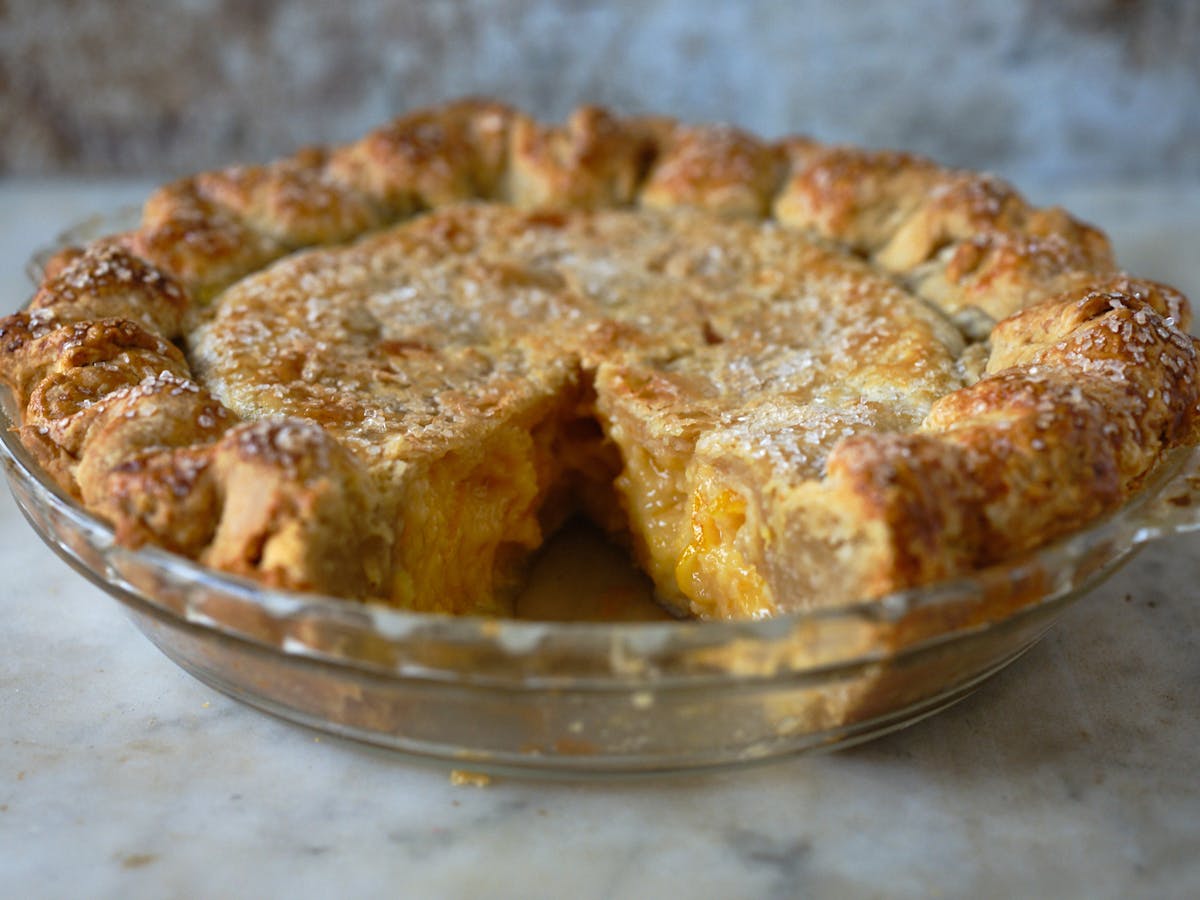
If you told me I could bake just one kind of pie in life, it would be this one. A flaky crusted Shaker lemon pie made with whole Meyer lemons sliced razor thin, macerated in sugar, and then chopped into a fragrant marmalade chunk. I love this pie for its simplicity, but have found over the years there are some details to fixate on to make it extra special.
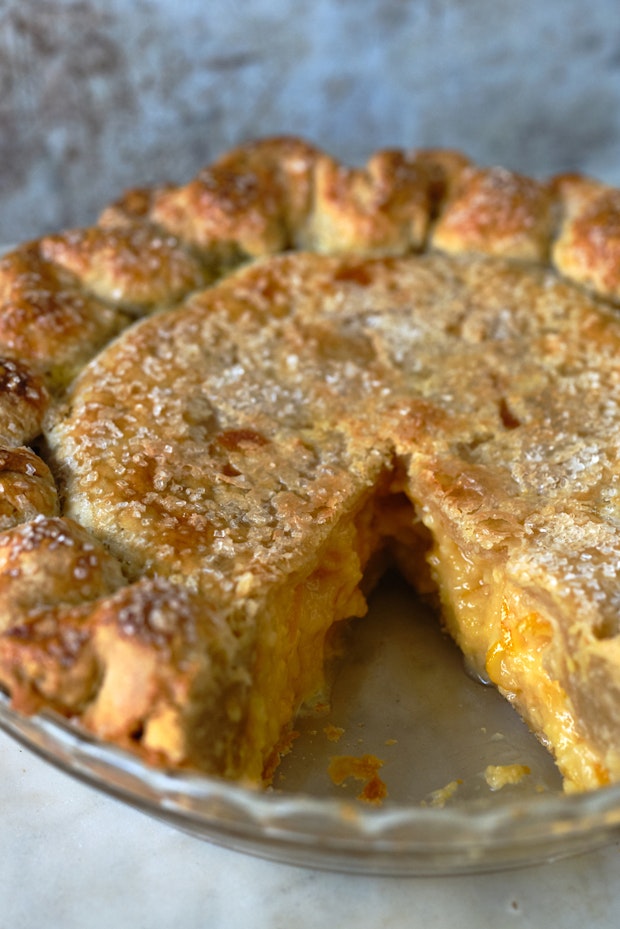
Shaker Lemon Pie: Whole Lemons
The Shaker lemon pie is attributed to the Shaker communities of the 19th century. Shakers continue to be celebrated for frugality and minimizing waste as well as their excellent design, craftsmanship, and agricultural acumen. The defining feature of the lemon shaker pie is the use of the (almost) the entire lemon - peel, pith, and flesh. The seeds get a pass. The Shaker’s weren’t unique in the use of the whole lemon. You see the use of whole citrus in a number of Sicilian cakes and pies as well.
Why I love This Pie:
The Shaker lemon pie is a fun pie to make and the payoff is big. You are rewarded with a pie that is intensely lemony with added dimension from the interplay between tart chunks, sweet custard, and buttery flakiness of the crust. It’s quick in the sense that it doesn’t require much active time. Especially if you’re comfortable shaping pies and working with pie crust dough.
What Kind of Lemons for a Shaker Lemon Pie?
The short answer here is very thinly sliced lemons of just about any sort. Make sure your slices are whisper thin, that should counter any bitterness you encounter (see photo below). You can use grocery store Lisbon or Eurekas or other common lemons, but I nearly always bake this pie with thin-skinned Meyer lemons. They’re perfect for this pie. If Meyer lemons are hard to come by where you live, opt for the least pithy lemons you can find. I’m hoping to try a version at some point using pink variegated lemons - for a pink lemonade Shaker pie. I’m imagining the blushy pink flesh would make a real beauty of a pie.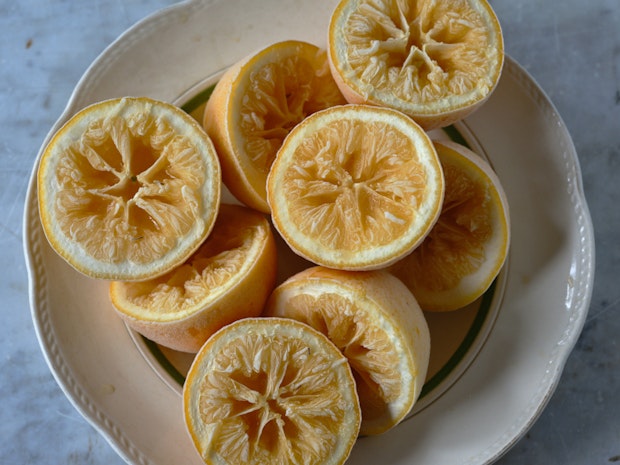
The Details: Texture
A lot of the Shaker lemon pies you see leave the lemon slices whole - wagon wheel style. The slices lose structure, collapse and soften as they macerate in the sugar (photo below), but I prefer to cut the lemons into chunks at this point. This results in more of a marmalade texture. I like the mouthfeel and also find the pie easier to slice later on.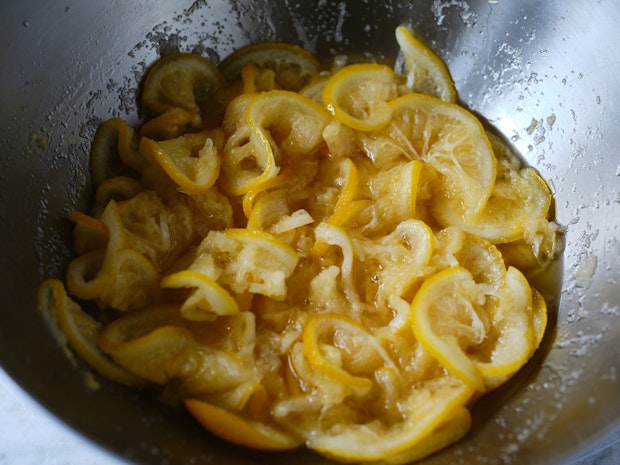
Shaker Lemon Pie: Pro-tips
Here are a few pro-tips for this pie.
- Glass pie dish: Number one tip, but don’t let this hold you back from baking a pie today. If you love pie, eventually you’re going to want to score a glass pie dish (photo below). It allows you to see the base of your pie take on color as it is baking.
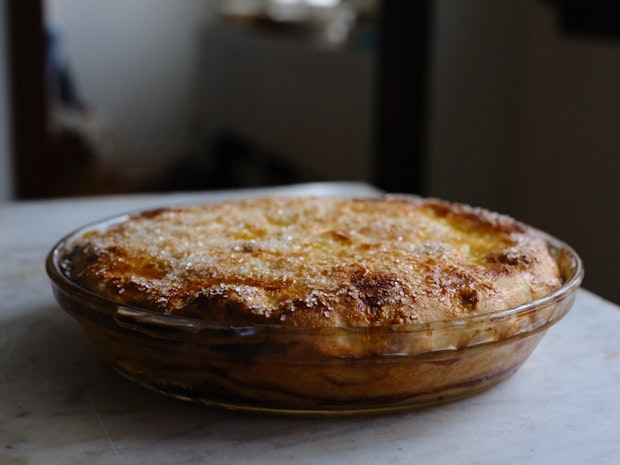
- Mandolin: Use a mandolin to slice your lemons. Carefully! Using the safety guard.This results in uniform slices, thinner and more consistent than you’re able to slice by hand.
- Work with confidence: Just keep going with the process. I think people are intimidated by making pie. I’m here to tell you that even when it is bad it is good. Just keep moving forward when you’re making a pie. And don’t give up. I was making this pie recently and assembled and shaped the whole thing before realizing I forgot to add the eggs to the filling. After a moment of having a crushed spirit I took the pie apart, dumped the filling, remixed it with the eggs, and re assembled the pie. It wasn’t as pretty, it had more rustic vibes than usually, but it was one of the best pies I’ve baked in a while! Pictured here.
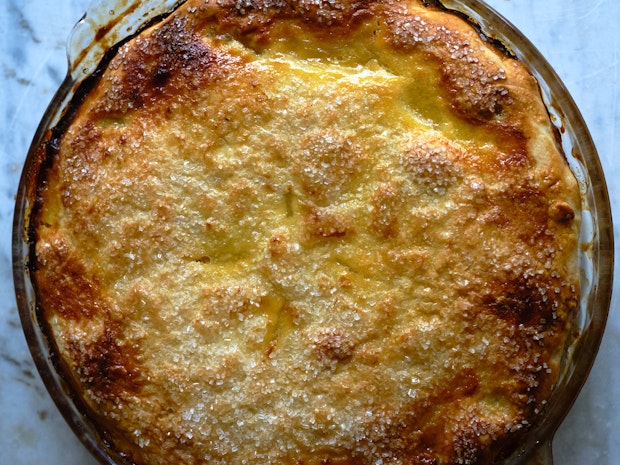
What Kind of Pie Crust is Best?
I’ve baked lemon Shaker pies using a range of crusts over the years. I went with a homemade rough puff pastry crust for a while, but eventually switched to this pie dough. It’s simple to make and results in a super-flaky all-butter pie crust. It bakes up beautifully golden thanks to a sugar-crusted egg wash prior to baking. I also love using it for this apple pie, and this deep dish quiche. I haven’t tested a Shaker lemon pie using store bought puff pastry, but I suspect you could get away with it? If you try, please leave a comment.
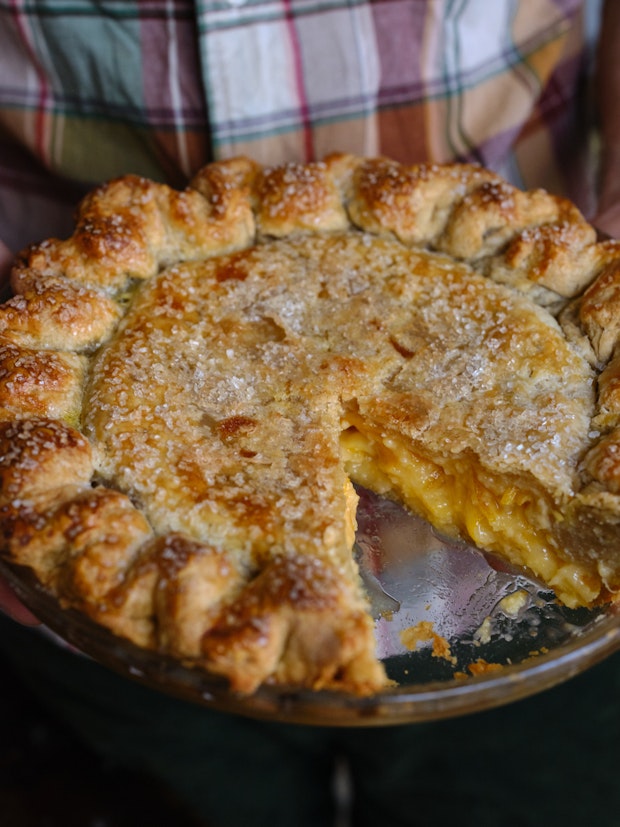
Shaker Lemon Pie: The Filling
The filling is what defines a Shaker lemon pie. You use thinly sliced whole lemons and let them macerate for hours in granulated sugar. After that, you add a few whisked eggs and anything else you’re inspired by. That’s your filling. It sets up beautifully as the pie bakes, and you are able to slice defined wedges after the pie cools. I like to keep this pie filling straight-forward for the most part, and typically bake it without other additions, but there are a few variations I’ve liked in the past.
- Candied ginger: add a small handful of well-chopped candied ginger to to the filling along with the eggs.
- Lime zest: Add a bit of lime zest to the lemon sugar mixture prior to macerating. I particularly like using Market lime zest here.
- A hint of lavender: I used TART Lavender Vinegar in the crust, and also allowed the lemons to macerate with a bit of lavender. Just until the flavor was nicely developed. Removed the lavender sprigs and baked. So nice! The key is introducing enough flavor, but not too much.

What else can I do with the Lemon Shaker Pie Filling?
If you’re not a pie person, and if you love the filling - it should taste amazing prior to adding the raw eggs - there are endless ways to incorporate it into other things. Let’s talk it through.
- Lemon Shaker Ice Cream Pie: Blind bake a pie crust and allow to cool completely. You can either fold some of the lemon-sugar (without egg) mixture into softened ice cream, or layer it into the pie crust. Top with toasted almonds, toasted coconut, and freeze.
- Lemon Shaker Parfait: Alternate a bit of the lemon-sugar mixture with yogurt, whipped cream, or ice bream in a tall champagne flute. Refrigerate, freeze, or serve immediately.
- Waffles: Use the filling in your favorite waffle recipe, offsetting the eggs called for.
- Lemon Shaker Crumble Pie: Arrange pie dough in baking dish for the bottom crust. Add the lemon filling as you would the original recipe. In place of the traditional top crust, add a good amount of streusel topping. Freeze for 15. Bake until golden topped and cooked through.
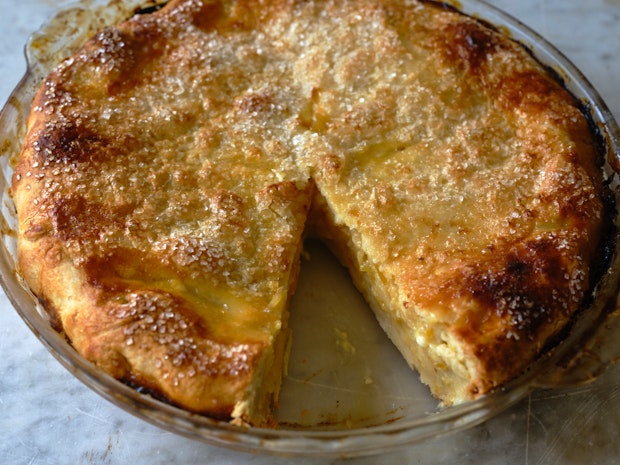
More Lemon Recipes
- Glazed Lemon Cake
- Lemony Olive Oil Banana Bread
- Meyer Lemon Focaccia
- Limoncello Macaroons
- Lemon Ricotta Pancakes
- How To Use Lots of Citrus
More Pie Recipes
- Shaker Apple Pie
- Coconut Cream Pie
- Pumpkin Pie
- Vegan Samosa Shepherd’s Pie
- Deep Dish Quiche
- Vegetable Pot Pie
Shaker Lemon Pie
The above post talks through my favorite lemon choices and include a few tips, tricks and details. I’ll call most of them out here in the recipe, but they’re worth a read before you jump in. This is my go-to pie crust recipe, enough for this double-crusted 9-inch pie.
- 2 pie crusts (top & bottom)
- 4 medium lemons (about 400 g), preferably Meyer lemons
- 10 ounces / 285g sugar
- 5 eggs
- 1 teaspoon almond or vanilla extract.
- 1/4 teaspoon fine grain sea salt
- 1/4 cup large grain sugar, to sprinkle on crust
-
Cut each lemon in half. Use a tiny spoon (1/4 teaspoon) to scoop out all the seeds you can find while retaining as much juice as possible. Any remaining seeds can be removed later in the process, so don’t obsess over this step.
-
Freeze the lemon halves for an hour or so. Remove from the freezer and carefully use a mandolin to shave into thin lemon wheels - 1/8-inch thick. Please use all safety precautions when using the mandolin. If the lemons are too frozen to slice, allow to thaw for ten minutes and try again. Transfer slices to a medium bowl and combine with the sugar. Stir well and allow to macerate for 4-5 hours, or overnight. Stir occasionally, and remove any additional seeds that might surface. They tend to float a bit. You’ll whisk 4 of the eggs just before filling and add it to the lemon mixture down the recipe a bit.
-
*This is a great time to make the pie dough, or pull pie dough from the freezer to thaw in the refrigerator.
-
Just before rolling out your pie dough, finish the filling. Use culinary scissors to cut the sugar-lemon mixture into pieces. I aim for a marmalade texture with lots of good-sized lemon peel chunks. Whisk four of the eggs and add to the lemon-sugar mixture. Add the extract and salt and stir well. Set aside.
-
Heat the oven to 425°F with a rack in the center. Heat the oven for at least 30 minutes before baking pies - you want to make sure it’s hot and ready to go. Also, clear a space in the freezer to chill the pie before baking.
-
If your dough has been chilling overnight allow it to sit at room temperature for a bit before rolling out - 15 minutes or so. Lightly flour your work surface and rolling pin, and roll the pie dough out, large enough to relax into your pie dish with extra dough an inch or two beyond the edge. You’re going to want to turn the pie dough clockwise after every few passes with the rolling pin to prevent sticking. Flour more as needed.
-
Transfer the dough for the bottom crust into the pie dish by gently wrapping it around your rolling pin and unrolling it across your pie dish. Coax the pie dough into place, and then press into the pan to anchor it. Roll out the top pie crust. You want to work relatively quickly at this point so your dough doesn’t warm.
-
Gently pour the lemon filling into the dough-line pie dish. Drape the other round of pie dough on top and trim so you have about 1-inch of dough hanging beyond the edge of the dish. I like a lot of crust so, if I’m being honest, I don’t always trim a lot at this point. But trimming can make things easier to work with. Press the edges of the pie shell together to seal things, and fold the edge of the crust over or under, and crimp or pinch around the edge using a fork or pressing your thumb and forefinger of one hand into the forefinger of the other hand. Carefully place the entire pie in the freezer for 15 minutes.
-
In the meantime, whisk the remaining egg. When it is time, remove the pie from the freezer, cut a few slits in the top to allow steam to escape while the pie bakes, and gently brush with enough egg to coat all of the top crust. Sprinkle generously with sugar - I like the larger sugar crystals.
-
Put the pie on a baking sheet to catch any drips and place in the oven. Dial back the heat to 375°F. You’re going to bake the pie for about an hour, but start checking on it about 45 minutes in. At this point I often spin it 180 degrees in the oven, and I’ll make note if I think the top of the pie is getting too dark. If so, place a sheet of aluminum foil over it until the bottom catches up. When everything is deeply golden remove from the oven and cool on a pie rack for 2-3 hours before slicing. If you have leftovers, you can refrigerate this pie for up to a week. Well-wrapped, and completely cooled, it also freezes well for up to a couple months.
Makes one 9-inch pie.


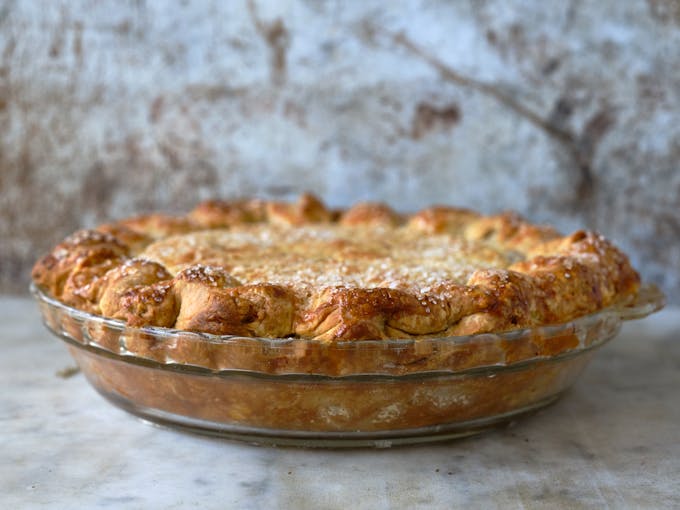
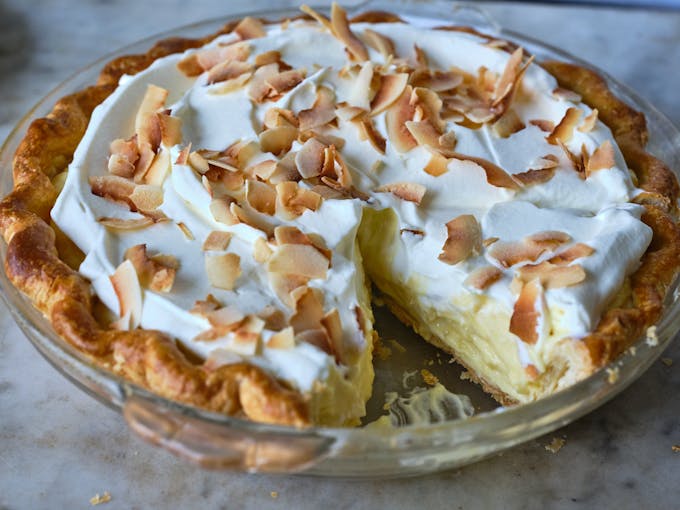
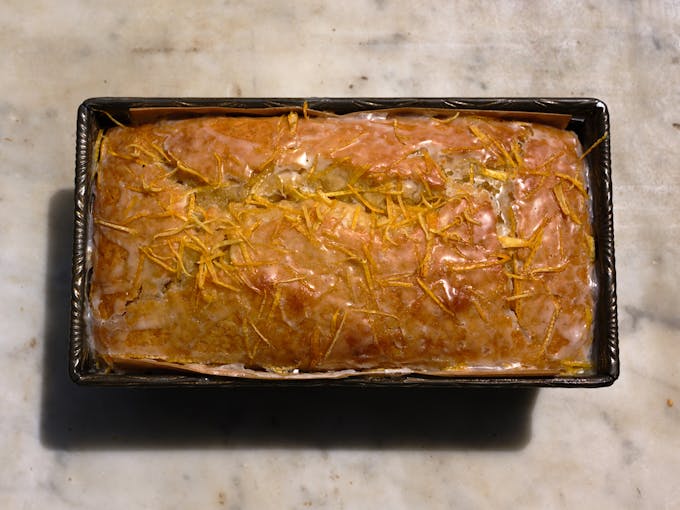
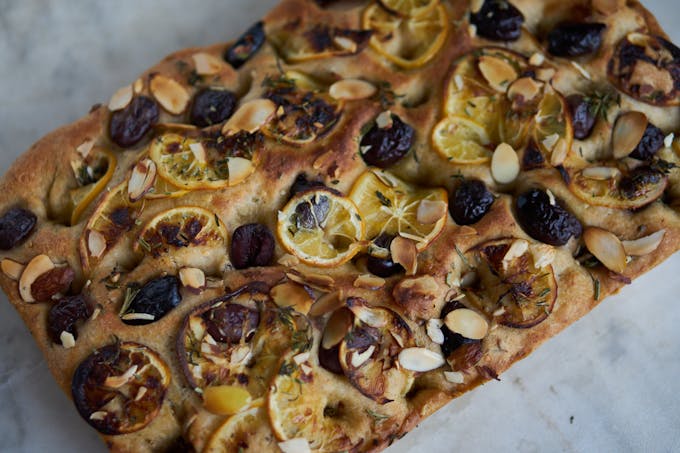
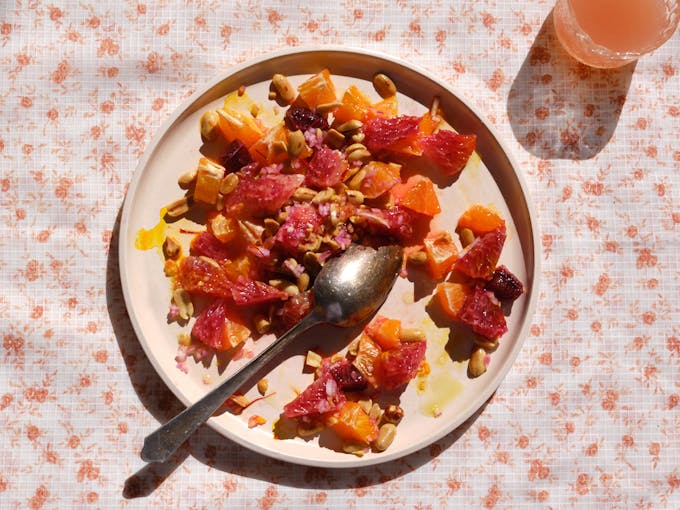
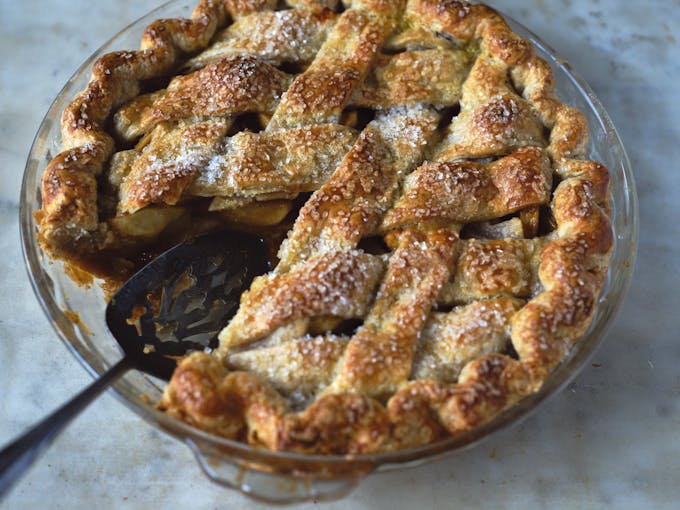
Post Your Comment
Comments
It’s February in Southern California, which means my tangerine trees are exploding and I’m always looking for something new to make with them. Last week, I made Tangerine Curd, they’re a bit on the tart side, so it worked well. Any thoughts on this?
Do you parbake the crust?
Hi John – not for this pie.
I made this for Thanksgiving and it was delicious but INTENSE. I’m a low sugar just eat a lemon type of person so I’m not sure what I did to make it so intense. Is it possible to soak them too long before cooking?
I’d never heard of this type of pie before visiting your site, but am oh so glad I tried it. It’s delicious and really easy to make. I’m sure I’ll make it again whenever life gives me lemons! Thank you for sharing a great recipe
Thanks Nicole! So happy you enjoyed it.
Used regular yellow lemons. Needed more sugar as it was still really sour and little bitter from the rinds
Could you make the filling ahead of time and freeze? I have A LOT of lemons to use up. Thank you!
Hi Ashley – I haven’t tested that exactly. I think what I would do it halve the lemons, seeds them, freeze them, and then they’re ready to slice when you want to bake the pie.
this looks delicious! I love lemon in sweet and savoury dishes . Sorry tho, I have to disagree about using a glass pie dish. Glass is not a good conductor of heat, so a metal dish is much better for baking.
Hi Sherry! I’ve had great results in both, but for me, being able to see how the base is progressing is key. Love my glass pie dish.
I LOVE anything Lemon
Do you have a video for this Shaker Lemon Pie
I am a little confused about the lemon procedure
Thank you
Hi Eileen – not yet. The gist is the following: cut lemons in half, and removed as many seeds as possible. Freeze the lemon halves for a bit to firm them up and make them easier to slice. Slice very thinly preferably using a mandoline and combine in a bowl with sugar. Allow to sit for at least 4-5 hours, stirring occasionally. Use scissors to cut lemons into smaller chunks if you like. Hope this makes sense. Once you get the lemons to this stage you add the eggs and proceed. xx!
Ohh yummy
I am a lemon fiend – cake, pie, pastry, pudding, candy, ice cream, anything and everything lemon. But nothing mild, please; I need bold, vibrant, strong lemon flavor. THIS PIE IS PURE CULINARY BLISS!
I made this pie several times a year for a couple decades, but always left the lemon slices whole. That changes today- I’m going to chop ’em up as the recipe says. But can I cut them before macerating? I’m guessing they may lose their structure?
Hi Robynne – I think you could chop them prior to macerating. I just like to do it after so I can control exactly the size and shape of the chunks.
More Recipes
Weekly recipes and inspirations.
Popular Ingredients